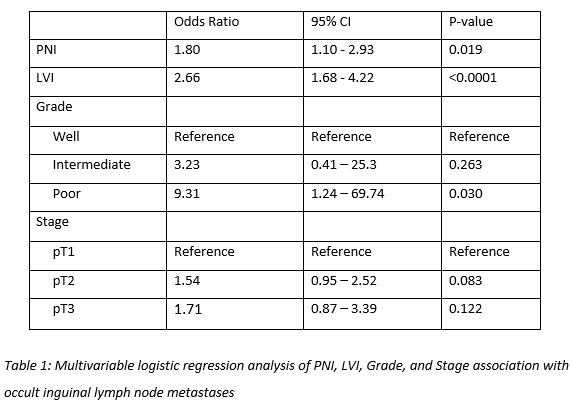Back
Poster, Podium & Video Sessions
Podium
PD51: Penile & Testicular Cancer II
PD51-10: Perineural invasion as a prognostic indicator for early metastatic spread in penile cancer
Sunday, May 15, 2022
5:00 PM – 5:10 PM
Location: Room 245
Titus Murphy*, Luis Ribeiro, Marta Skrodzka, Eleni Anastasiadis, Sylvia Yan, Benjamin Ayres, Nicholas Watkin, London, United Kingdom
- TM
Podium Presenter(s)
Introduction: In a previous 2-centre study (Eur Urol 2010), we demonstrated that grade 3 disease (G3) and lympho-vascular invasion (LVI) were independent risk factors for early metastatic SCC in penile cancer (SCCp). However, the role of perineural invasion (PNI) was not formally investigated. Our objective was to re-assess previously analysed variables using an updated data set and to determine whether PNI may additionally have a role in the prediction of occult lymph node metastases in SCCp.
Methods: Data was collected prospectively using a minimum data set generated by specialist histopathologists and multi-disciplinary team input from 2001–2020. For the analysis, all patients with SCCp and bilateral cN0 were included. Pathology from sentinel nodes stratified patients into pN+/pN0. Univariable and multivariable analyses were carried out using binary logistic regression to identify statistically significant independent risk factors for occult/early lymph node metastases.
Results: 735 patients (SCCp/cN0) were identified. 19% were pN+. Univariable analysis demonstrated histologic grade, stage, LVI and PNI as all being significantly (p < 0.05) associated with occult nodal disease. PNI remained a significant risk factor on multivariable analysis (OR 1.80, 95% CI 1.10-2.93, p=0.019) in addition to Grade 3 disease and LVI (Table 1).
Conclusions: PNI is an independent predictor of occult metastatic spread in penile carcinoma. Until now, the role of PNI as a prognostic indicator has not been as extensively examined when compared with tumour grade, stage, and presence of LVI. Its significance is not reflected in current guidelines on disease staging and management and this should be reconsidered.
Source of Funding: St George's University Hospitals NHS Foundation Trust

Methods: Data was collected prospectively using a minimum data set generated by specialist histopathologists and multi-disciplinary team input from 2001–2020. For the analysis, all patients with SCCp and bilateral cN0 were included. Pathology from sentinel nodes stratified patients into pN+/pN0. Univariable and multivariable analyses were carried out using binary logistic regression to identify statistically significant independent risk factors for occult/early lymph node metastases.
Results: 735 patients (SCCp/cN0) were identified. 19% were pN+. Univariable analysis demonstrated histologic grade, stage, LVI and PNI as all being significantly (p < 0.05) associated with occult nodal disease. PNI remained a significant risk factor on multivariable analysis (OR 1.80, 95% CI 1.10-2.93, p=0.019) in addition to Grade 3 disease and LVI (Table 1).
Conclusions: PNI is an independent predictor of occult metastatic spread in penile carcinoma. Until now, the role of PNI as a prognostic indicator has not been as extensively examined when compared with tumour grade, stage, and presence of LVI. Its significance is not reflected in current guidelines on disease staging and management and this should be reconsidered.
Source of Funding: St George's University Hospitals NHS Foundation Trust


.jpg)
.jpg)